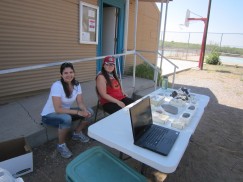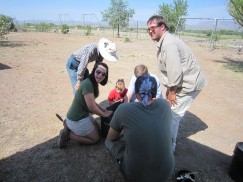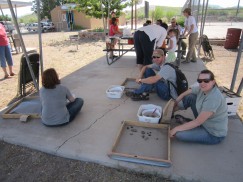- Home
- >
- Preservation Archaeology Blog
- >
- Student Post: Reaching Out
 |
By Deborah L. Huntley, Preservation Archaeologist
|

Andi Sei understands why we must share what we are learning with the community:
Archaeology isn’t just for the academic. Public education is vital for the community and the archaeologist.
This past Saturday, our field school held this season’s first public outreach event for the youth of the Gila community. Our theme was very simple: What is archaeology? The romantic treasure hunting of Indiana Jones is, unfortunately, the impression that most of the public has about the field. That picture is very wrong, and can often cause problems for working archaeologists.

Artifacts—“treasures”—are not the goal of this profession. We are trying to learn about human behavior, not possess their stuff. It’s not the artifact, but its context—where it was, how it was found, what was with it—that is the important and interesting aspect of the find.
We illustrated these points through various activities. The picturesque impression of archaeology was countered by giving the kids a chance to be an archaeologist for the day. Using a mock dig, the kids got a chance to experience the dirty and frustrating nature of being in the field, while also having that satisfaction of finding an interesting pottery piece. They also helped us clean our backlog of unwashed artifacts, which provided another object lesson about how archaeology is a lot of hard work in a lot of dirt!

A pottery-making activity and a stone tool demonstration showed participants how these artifacts impart important information about the people who made them, such as the food they ate and how they used raw materials to survive.
A show-and-tell table of artifacts illustrated the importance of context. We talked about how something really cool isn’t always very helpful for understanding human behavior without its backstory, which is found in the artifact’s context.
Outreach events such as these also have an ethical component beyond the educational aim. By interacting with the community and being transparent about our goals and interests, archaeologists build a positive relationship with the community. Sharing our findings and our profession through these events helps create a dialogue between local residents and archaeologists. This not only helps the present project gain information and local support, but also helps build community and eliminates any confusion about the archaeologists’ motives for working on local lands.
Explore the News
-
Join Today
Keep up with the latest discoveries in southwestern archaeology. Join today, and receive Archaeology Southwest Magazine, among other member benefits.